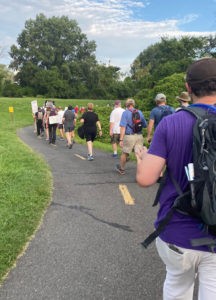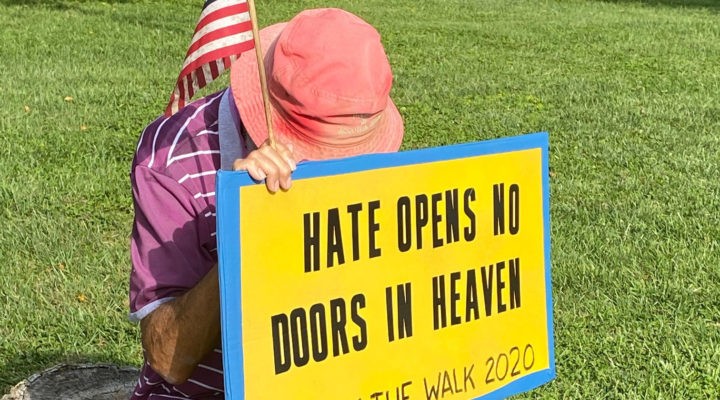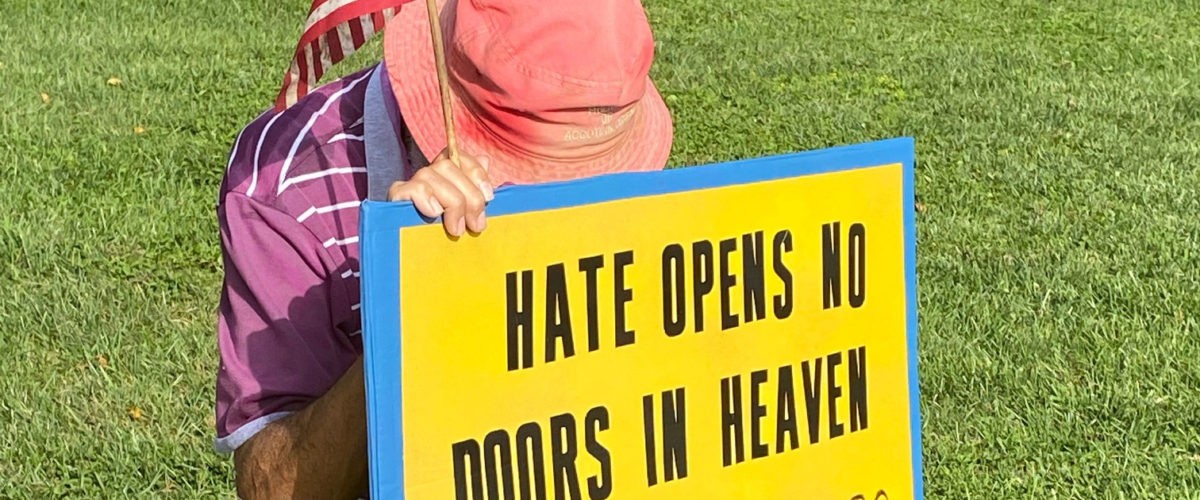Walk the Walk was a walking pilgrimage of racial reckoning, resolve and love organized and supported by Red Letter Christians, Faith and Action, Vote Common Good, Greater Things, and the Truth and Conciliation Commission. Covering the 120 miles between Charlottesville, Va., and Washington, D.C., the pilgrimage was a calling to faith leaders, and a witness to all, that the present and future cannot be endured without reckoning with the past.
According to organizers, the pilgrimage “emerged from a declaration that white clergy and faith leaders developed in June to take responsibility for our role in uprooting white supremacy and anti-Blackness in our lives, faith institutions, and nation.”
 I joined the pilgrimage in Annandale, Va., and walked the final 31 miles. I walk frequently, but I seldom pilgrimage. As an avid walker, I am familiar with putting on my headphones and walking the streets of Greenville, listening to a favorite podcast, or soothing my spirit with refreshing music. At times I do this walking on hiking trails, where I travel in silence mode, without the distraction of voices in my ears, listening at times to God, but at other times to the wind in the trees or the squirrels in the brush.
I joined the pilgrimage in Annandale, Va., and walked the final 31 miles. I walk frequently, but I seldom pilgrimage. As an avid walker, I am familiar with putting on my headphones and walking the streets of Greenville, listening to a favorite podcast, or soothing my spirit with refreshing music. At times I do this walking on hiking trails, where I travel in silence mode, without the distraction of voices in my ears, listening at times to God, but at other times to the wind in the trees or the squirrels in the brush.
A pilgrimage, however, is more than a walk or hike. It is like playing hide-and-seek without knowing exactly what you are seeking until you discover it. Pope Benedict XVI described a pilgrimage as “stepping out of ourselves in order to encounter God where he has revealed himself.”
My pilgrimage was a journey not to Washington but to remind myself that “Jesus wept,” but I don’t. I do plenty in the name of the kingdom of God, but I have failed to weep. I read about Brianna Taylor and click on the next article. I see the footage of George Floyd, and say, “What was that officer thinking?” then I watch the highlights of the Braves game. The tenderness and empathy our faith taught me has been paved over by indifference and busyness.
On my first day on this pilgrimage, one of our fellow pilgrims shared with me the word sawubona, which is a South African tribal greeting. It means “I see you.” To see someone is powerful. To look into their eyes, to see them not as a stranger, to see them full of promise and love, to see them as a beloved child of our God.
“The tenderness and empathy our faith taught me has been paved over by indifference and busyness.”
Much of my pilgrimage was about opening my eyes and opening my soul in order to see others. When we see the anti-Blackness, the hatred toward people of color, and our white supremacy, we take a step away from indifference and move toward joining Jesus and crying.
Each day, my eyes were opened to see. I saw store owners who were people of color emerge from their businesses to welcome us. I saw them trying to make a living. I saw the eyes of the African American motorist who slowed down to look us in the eye and say, “Thank you.” I saw African American children, wearing “Black Lives Matter” T-shirts. I saw in these children the promise and innocence of childhood being smothered by the weekly news of death and oppression of people who share their skin color.
After we crossed the 14th Street bridge into Washington, we paused at the Holocaust Memorial Museum. I looked, and I saw what happened to people when empathy and courage died. I looked, and I saw what will happen again, this time to brown and Black people, if people like me only preach love and refuse to call us toward repentance.
A few hundred yards later, we paused at the Museum of African American History and Culture, and again I remembered sawubona. Not only seeing Harriet Tubman but seeing Tamir Rice and the little girl staring at me with a T-shirt that reads, “I can’t breathe.” Opening the eyes opens the soul.
It’s not complicated, but it will be hard. It’s not complicated, but it will require persistence. It’s not complicated, but it will demand more than prayer and love. Charting a new course of racial reconciliation and building a community for the common good will ask us first to “see” the person of color. Really see them. Seeing will lead to weeping, and weeping with Jesus is a good thing. If a pilgrimage is a game of hide-and-seek, I found what I needed: eyes to see.
John Roy serves as pastor of Pelham Road Baptist Church in Greenville, S.C.


